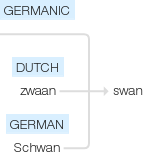Swan
Old English, of Germanic origin; related to Dutch zwaan and German Schwan . The current sense of the verb originated as military slang, referring to the free movement of armoured vehicles.
wiktionary
From Middle English swan, from Old English swan, from Proto-West Germanic *swan, from Proto-Germanic *swanaz(“swan”, literally “the singing bird”), from Proto-Indo-European*swonh₂-/ *swenh₂-(“to sing, make sound”). Cognate with West Frisian swan, Low German Swaan, swan, Dutch zwaan, German Schwan, Norwegian svane, Swedish svan. Related also to Old English ġeswin(“melody, song”), Old English swinsian(“to make melody”), Latin sonus(“sound”), Russian звон(zvon, “ringing”), Russian звук(zvuk, “sound”).
Probably from dialectal I s’wan, a corruption of I shall warrant; or possibly from a minced form of I swear on.
etymonline
swan (n.)
Old English swan "swan," from Proto-Germanic *swanaz "singer" (source also of Old Saxon swan, Old Norse svanr, Danish svane, Swedish svan, Middle Dutch swane, Dutch zwaan, Old High German swan, German Schwan), probably literally "the singing bird" (from PIE root *swen- "to make sound"). If so, it is related to Old English geswin "melody, song" and swinsian "to make melody."
In classical mythology, sacred to Apollo and to Venus. The singing of swans before death was alluded to by Chaucer (late 14c.), but swan-song (1831) is a translation of German Schwanengesang. The ancient Indo-European mythical swan-maiden so called by mythographers from 1829. Swan dive is recorded from 1898.
